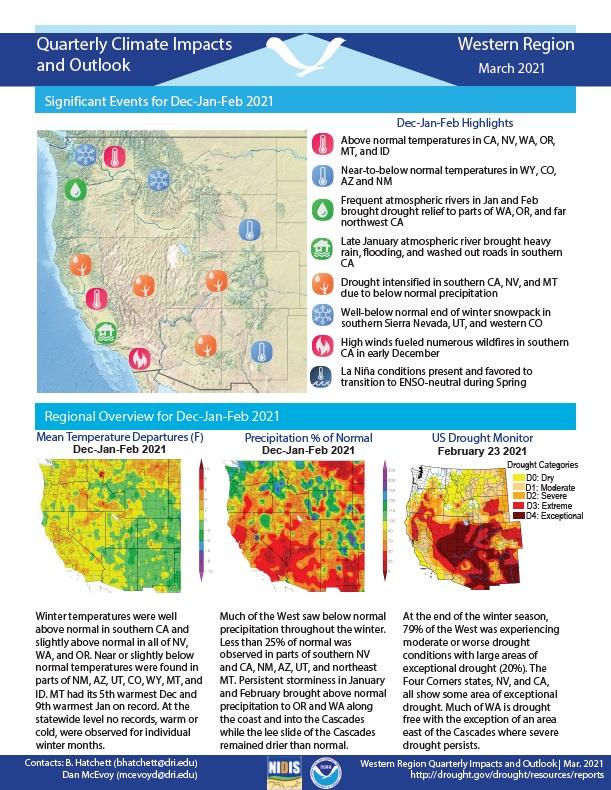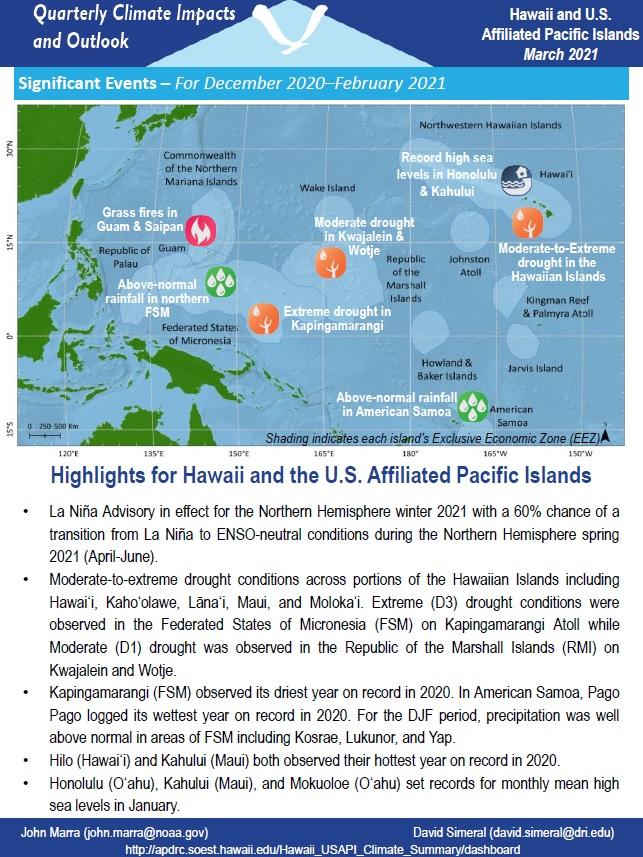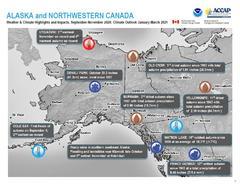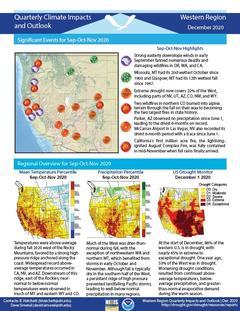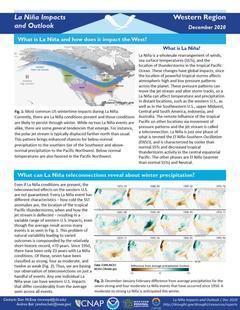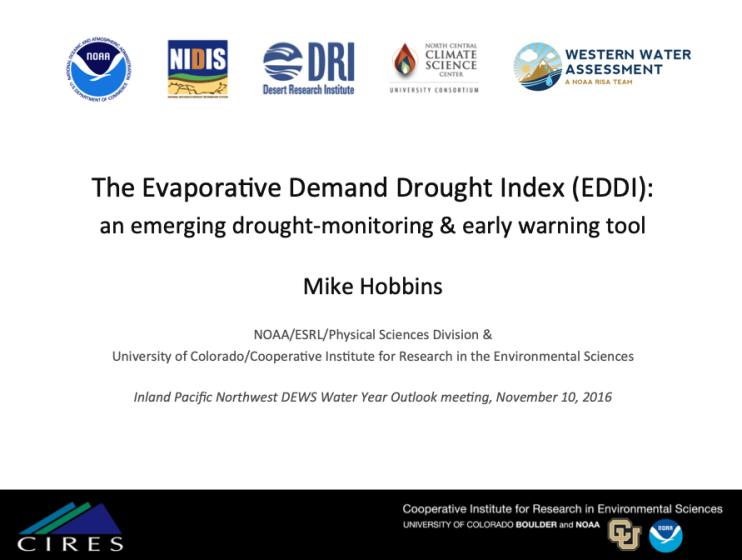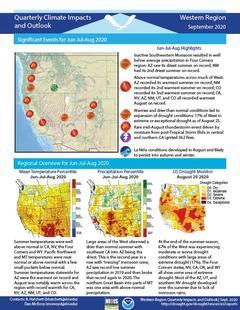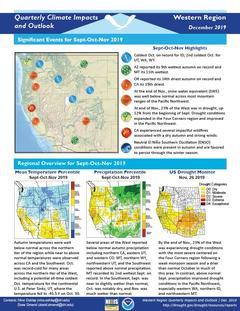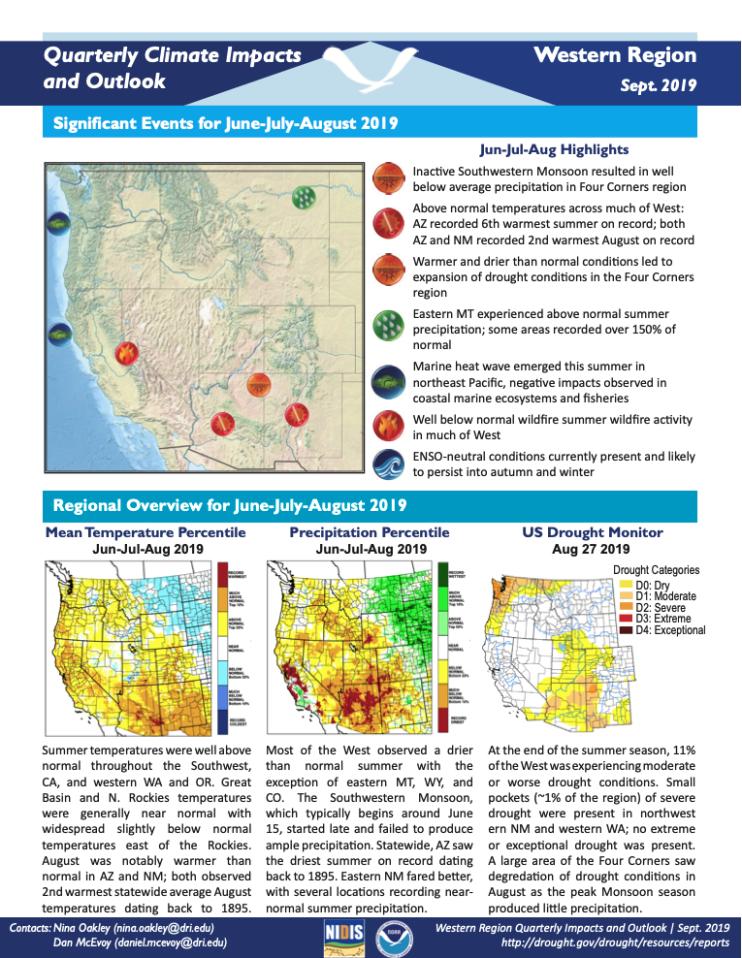Quarterly Climate Impacts and Outlook for the Western Region for December 2020 – February 2021. Dated March 2021.
Winter temperatures were well above normal in southern California and slightly above normal in all of Nevada, Washington, and Oregon. Near or slightly below normal temperatures were found in parts of New Mexico, Arizona, Utah, Colorado, Wyoming, Montana, and Idaho. Much of the West saw below normal precipitation throughout the winter.
Quarterly Climate Impacts and Outlook for Hawaii and the U.S. Pacific Islands Region for December 2020 – February 2021. Dated March 2021.
Across the central and eastern equatorial Pacific Ocean, sea-surface temperatures (SSTs) were below normal with La Niña conditions present and a La Niña Advisory still in effect as of the end of February.
Quarterly Climate Impacts and Outlook for Alaska and Northwestern Canada for December 2020 - February 2021; outlook for April - June 2021. Dated March 2021.
Winter started at the beginning of November with the early arrival of a record setting 40cm snowfall. Conditions remained snowy resulting in 66cm depth of snow on the ground at the airport at the end of February. Northwest Canada & Alaska was mostly drier than normal.
Quarterly Climate Impacts and Outlook for Alaska and Northwestern Canada for September – November 2020; outlook for January – March 2021. Dated December 2020.
A strong storm moved from the northwest Bering Sea, across Chukotka and into the southwest Chukchi Sea November 5 to 7. The storm brought snow and rain to St. Lawrence Island, the Bering Strait and most of the Seward Peninsula. Heavy snow also fell over parts of Interior Alaska on November 5-7 from the same storm system.
Quarterly Climate Impacts and Outlook for the Western Region for September – November 2020. Dated December 2020.
Temperatures were above-average during the fall west of the Rocky Mountains, favored by a strong high pressure ridge anchored along the coast. Although fall is typically dry in the southern half of the West, the persistent ridge prevented landfalling Pacific storms, leading to well-below normal precipitation in many regions.
Provides information on the typical La Niña winter pattern; the La Niña outlook; potential impacts; and comparisons of conditions during previous La Niña years.
NOAA’s Regional Climate Services Program created these outlooks to inform the public about climate impacts within their respective regions. Each regional report contains easy-to-understand language, and anyone can access them through the Drought Portal.
A presentation at the Inland Pacific Northwest DEWS Water Year Outlook meeting, November 10, 2016.
Discussion of evaporative demand (how “thirsty” the atmosphere is), how to calculate the evaporative demand index, and why it matters as a leading indicator of drought.
Quarterly Climate Impacts and Outlook for the Western Region for June – August 2020. Dated September 2020.
Summer temperatures were well above normal in California, Nevada, the Four Corners and Wyoming. Pacific Northwest and Montana temperatures were near normal or above normal with a few small pockets below normal. Large areas of the West observed a drier than normal summer with southeast California into Arizona being the driest. This is the second year in a row with “missing” monsoon rains.
Quarterly Climate Impacts and Outlook for the Western Region for September – November 2019. Dated December 2019.
Autumn temperatures were well below normal across the northern tier of the region while near to above normal temperatures were observed across California and the Southwest. Several areas of the West reported below normal autumn precipitation including northern California, eastern Utah, and western Colorado. Montana, northern Wyoming, northwestern Utah, and the Southwest reported above normal precipitation.
Quarterly Climate Impacts and Outlook for the Western Region for June – August 2019. Dated September 2019.


